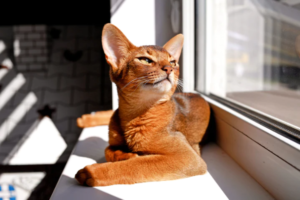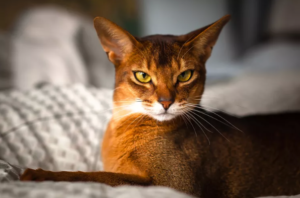Abyssinian Cat Cost: Everything You Should Know Before Buying an Abyssinian Cat

Abyssinian Cat
Unlocking the World of Abyssinian Cats: Price, Care, and Feline Friends
Are you considering welcoming a spirited and elegant feline companion into your life? The Abyssinian cat might be just the right choice. Renowned for their striking appearance and spirited personalities, Abyssinian cats have captured the hearts of cat enthusiasts worldwide. However, owning an Abyssinian cat entails a mix of responsibilities and pleasures. As an enthusiastic Abyssinian cat expert, I’m delighted to be your guide in this SEO-optimized 1,500-word blog. We’ll explore the factors influencing their cost, essential considerations before bringing one home, tips for proper care, common health concerns, and how to provide a balanced diet from the perspective of someone who adores these enchanting felines.
Unveiling the Cost of an Abyssinian Cat
One of the first questions that arises when contemplating an Abyssinian cat as a feline friend is, “How much does an Abyssinian cat cost?” The price can vary significantly, depending on several key factors:
1. Breed Quality: Abyssinian cats from reputable breeders with champion bloodlines often command higher prices due to their superior genetic qualities.
2. Breeder Reputation: Experienced and ethical breeders may charge more for kittens from well-cared-for, healthy cats.
3. Kitten’s Age: Kittens are generally more expensive than adult cats, primarily because they require a series of vaccinations and are highly sought after for their playful nature.
4. Location: Prices can fluctuate based on your location. Urban areas tend to have higher prices due to increased demand and living costs.
5. Health and Documentation: Abyssinian cats with health certificates, vaccination records, and pedigree documentation may cost more due to their perceived quality.
The cost of an Abyssinian cat can range from $800 to $2,500 or more, depending on these factors. It’s essential to do thorough research, visit the breeder or seller in person if possible, and make sure you’re obtaining a healthy and well-raised cat.
Beyond the Initial Cost
Owning an Abyssinian cat involves more than just the upfront cost. Additional expenses come with responsible pet ownership:
1. Housing: Ensure you have a comfortable living environment with space for your Abyssinian cat to play, explore, and rest.
2. Food and Supplies: Budget for high-quality cat food, feeding bowls, grooming tools, toys, and a scratching post to keep your feline friend engaged.
3. Training and Socialization: Abyssinian cats are intelligent and active. Invest time in training and socializing them to foster good behavior and prevent boredom.
4. Grooming: Their short, ticked coats require minimal grooming, but regular brushing will help reduce shedding.
5. Healthcare: Routine vet visits, vaccinations, and potential emergency medical expenses should be anticipated. Pet insurance can help with unexpected healthcare costs.
6. Social Interaction: Abyssinian cats are social and crave interaction. Be prepared to spend time playing and bonding with your feline companion.
7. Travel Costs: If you travel frequently, budget for pet-sitting or boarding services.
8. Licensing: Check local regulations as some areas may require licensing and registration of pet cats.

Abyssinian Cat
Essential Facts for Prospective Abyssinian Cat Owners
Before introducing an Abyssinian cat into your home, here are some critical facts to consider:
1. Appearance:Abyssinian cats have striking, ticked coats with colors like ruddy, red, blue, and fawn. They are known for their regal posture and expressive almond-shaped eyes.
2. Temperament: These cats are lively, playful, and affectionate. They enjoy engaging with their human companions and thrive on interactive play.
3. Size: Abyssinians are medium-sized cats, typically weighing 6 to 10 pounds and standing 8 to 10 inches tall at the shoulder.
4. Lifespan: With proper care, Abyssinian cats can live for 12 to 15 years or longer, making them a long-term commitment.
5. Exercise Needs: Abyssinians are active cats that require daily playtime and mental stimulation.
6. Minimal Grooming: Their short coat requires minimal grooming but is prone to shedding.
Proper Care and Nutrition for Your Abyssinian Cat
Caring for an Abyssinian cat involves several responsibilities:
1. Feeding: Provide your Abyssinian cat with high-quality cat food suitable for their age and dietary needs. Measure portions to prevent overfeeding and obesity.
2. Grooming: Brush your cat’s coat regularly to minimize shedding and reduce hairballs. Dental care is also important.
3. Exercise:Keep your Abyssinian cat mentally stimulated with interactive play. Puzzle toys and cat trees are great choices.
4. Training: Positive reinforcement training can help your cat learn commands and good behavior.
5. Healthcare: Regular vet check-ups are essential. Keep up with vaccinations, flea prevention, and dental care.
Common Health Issues with Abyssinian Cats
Abyssinian cats are generally robust, but they can be prone to specific health issues, including:
1. Gingivitis: These cats may develop gum inflammation, so dental care is vital.
2. Feline Hyperesthesia Syndrome: Abyssinians can be more susceptible to this rare but poorly understood condition, characterized by over-grooming and skin sensitivity.
3. Progressive Retinal Atrophy (PRA): Some Abyssinians can inherit this hereditary eye condition leading to vision loss.
4. Kidney Disease: Abyssinians are susceptible to kidney issues as they age, making regular check-ups critical.
5. Patellar Luxation: This joint condition can occur in some cats, causing discomfort and limping.
A Balanced Diet for Your Abyssinian Cat
A well-balanced diet is crucial for your Abyssinian cat’s overall health. Consider the following dietary tips:
1. High-Quality Cat Food: Choose cat food with high protein content and minimal fillers. Ensure it’s suitable for your cat’s age and activity level.
2. Portion Control: Measure your cat’s food to avoid overfeeding and obesity.
3. Fresh Water: Always provide clean, fresh water for your cat.
4. Treats: Use treats sparingly and opt for healthy options like small pieces of cooked chicken or catnip treats.
Welcoming an Abyssinian cat into your life brings joy, elegance, and endless companionship. While the cost of an Abyssinian cat is a significant consideration, the love and laughter they offer are priceless. With proper care, a balanced diet, and a nurturing environment, you and your Abyssinian cat can savor a lifetime of enchanting feline friendship. So, embark on the journey of Abyssinian cat ownership, and let your heart be captured by their grace and spirit.
Free Reports
- Cockatiel Sounds: What Type of Sounds Do Cockatiels Make?
- Cane Corso Lab Mix: What You Need To Know Before Adopting Your New Cane Corso Lab Mix
- Belgian Malinois Grooming: How to Properly Care For Your Belgian Malinois
- Hamster Vomiting: What You Need To Do When Your Hamster is Vomiting
- Manchester Terrier Price: What You Should Before Adopting Your Manchester Terrier
- Boerboel Life Span: How Long Do Boerboel Dogs Usually Live?
- Canaan Dog Price: Everything You Should Know About Canaan Dogs Before Adopting
- Do Cane Corso Shed: How Much Cane Corsos Shed and How to Prevent Shedding
- Cane Corso German Shepherd Mix: Everything They Don’t Tell You About This Unique Mix
- Cane Corso Doberman Mix: Check Before You Buy! What They Don’t Tell You About Cane Corso Doberman Mixes
- Brindle Cane Corso: What You Need to Know Before Adopting
- Cockatiel Eye Problems: What to Do When Your Cockatiel Has an Eye Infection
- Top 25 Sun Conure Names: How to Name a Sun Conure, Care Tips and Tricks
- Friesian Horse Price: Everything You Need to Know Before You Buy a Friesian Horse
- Friesian Colors: The Uniqueness of Every Friesian Horse Color, Price and Care Tips